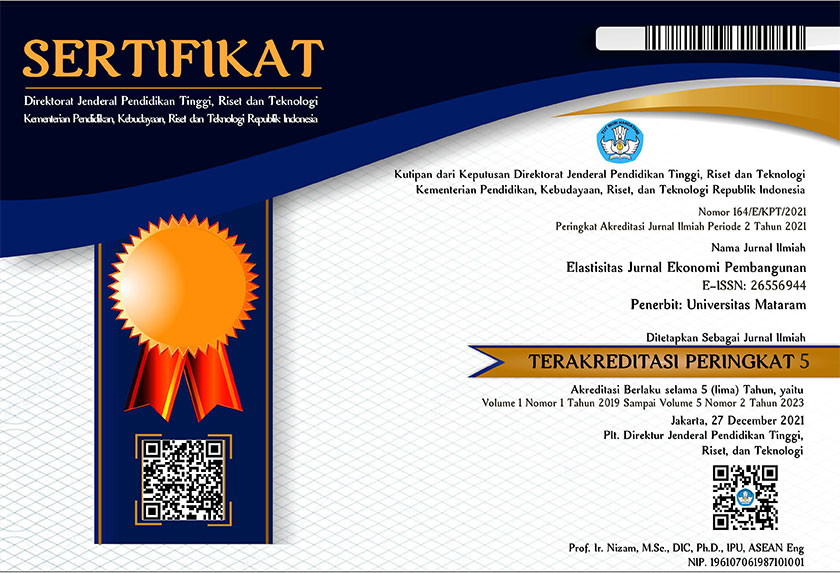ANALYSIS OF THE GREEN ECONOMY SUSTAINABILITY STATUS IN INDONESIA USING MULTIDIMENSIONAL SCALING
DOI:
https://doi.org/10.29303/e-jep.v7i1.01Keywords:
Green Economy, Multidimensional Scaling, Rap-GEI, Sustainability StatusAbstract
This current study aims to investigate the sustainability of the Green Economy Index assessment in Indonesia. The green economy is an economic model that carries out economic activities while taking into account environmental sustainability and social welfare. The multidimensional scaling through the Rapid Appraisal for Green Economy Index (Rap-GEI) ordination technique was employed in this study. Rap-GEI is a technique for assessing the sustainability of the green economy in Indonesia according to a number of attributes that are easy to assess multidimensionally. The results of the current study show that the sustainability status of the GEI assessment is less sustainable (45.47%) for the environmental dimension, quite sustainable (56.02%) for the economic dimension, and quite sustainable (55.30%) for the social dimension. The most sensitive attributes that require improvement are managed waste and share of renewable energy (environmental dimension), agricultural productivity and industrial sector labor productivity (economic dimension), as well as poverty rate and life expectancy (social dimension). In general, the results show that two of the three dimensions, namely economic and social, have a fairly good rating, but the environmental dimension still shows a poor rating and needs to be improved.
References
Bappenas. (2022). Green Economy Index : A Step Forward to Measure the Progress of Low Carbon and Green Economy in Indonesia. Bappenas.
Firmansyah, M. (2022). Konsep Turunan Green economy dan Penerapannya: Sebuah Analisis Literatur. Ecoplan. https://doi.org/10.20527/ecoplan.v5i2.543
Gautama, D. A. riangg. W., Perkasa, P., & Tuah. (2023). An Analysis Of Forest And Land Fire Extinguishing In Indonesia Influenced By The El Nino Phenomenon Using The Water Bombing Method. BALANGA: Jurnal Pendidikan Teknologi Dan Kejuruan. https://doi.org/10.37304/balanga.v11i2.11733
Kuvaini, A., Hidayat, A., Kusmana, C., & Basuni, S. (2019). Teknik Penilaian Multidimensi untuk Mengevaluasi Keberlanjutan Pengelolaan Hutan Mangrove di Pulau Kangean Provinsi Jawa Timur. Jurnal Wilayah Dan Lingkungan. https://doi.org/10.14710/jwl.7.3.137-152
Lingga, L. J., Yuana, M., Sari, N. A., Syahida, H. N., Sitorus, C., & Shahron. (2024). Sampah di Indonesia: Tantangan dan Solusi Menuju Perubahan Positif. INNOVATIVE: Journal Of Social Science Research, 4, 12235–12247.
Mahida, M. (2020). Pendekatan Multidimensional Scaling untuk Penilaian Status Keberlanjutan ATCS Kota Pintar Semarang. Warta Penelitian Perhubungan. https://doi.org/10.25104/warlit.v32i2.1367
Ramadhanty, N. R., Setiawan, J. F., Rudiyanto, Widodo, Kristijarso, Aini, S., Putra, A., & Arisandi, P. (2022). Rapfish Analysis (Rapid Appraisal for Fisheries) for Sustainability of Lobster (Panulirus Sp.) in Coastal Cilacap With a Blue Economy Approach to Maritime Security. American Academic Scientific Research Journal for Engineering, 85, 41–59. http://asrjetsjournal.org/
Reza, A. A., Cahyaningrum, D. C., & Hastuti, S. P. (2021). Analisis Status Keberlanjutan Sumber Mata Air Senjoyo pada Dimensi Ekologi dengan Metode RAP-WARES (Rapid Appraissal for Water Resources). Jurnal Ilmu Lingkungan. https://doi.org/10.14710/jil.19.3.588-598
Ritonga, Y., & Usiono. (2023). Sampah Dan Penyakit : Systematic Literature Review. Jurnal Kesehatan Tambusai, 4(4), 5148–5157. https://journal.universitaspahlawan.ac.id/index.php/jkt/article/view/19608/15775
Utama, R. C., Setyowati, E., & Matsaany, B. (2022). Angka Harapan Hidup dan Makroekonomi Berkaitan? Seminar Nasional Official Statistics. https://doi.org/10.34123/semnasoffstat.v2022i1.1148
Widiansyah, A. (2017). Peran ekonomi dalam pendidikan dan pendidikan dalam pembangunan ekonomi. Cakrawala-Jurnal Humaniora.
Downloads
Published
How to Cite
Issue
Section
License
Copyright (c) 2025 Endah Setyowati, Anisa Rahmawati

This work is licensed under a Creative Commons Attribution-ShareAlike 4.0 International License.






